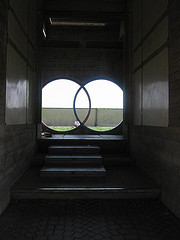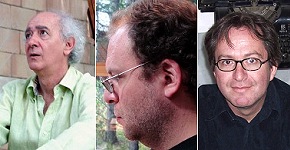by Patrick Durek
Since its inception in 1985, Cygnus Ensemble has been at the forefront of chamber groups dedicated to expanding the repertory. Generating works for subsets of its unorthodox instrumentation—two guitars, cello, oboe, flute, and violin—has been its primary mission, and while premieres by well-known composers (Charles Wuorinen, Meyer Kupferman, and Milton Babbitt) have been given, it is the group’s championing of works by up-and-coming composers that has perhaps been most significant. Robert Martin, Jonathan Dawe, and Robert Pollock have all written multiple works for Cygnus Ensemble and are now firmly rooted in the Northeastern milieu that Wuorinen, Kupferman, and Babbitt had for so long dominated.
The group has a dynamic that has, for the past two decades, given it a credence that many other new music ensembles lack, making it an attractive premiere-vehicle for the established composer and a coveted marketing entity for the aspiring composer. Part of this dynamic is created by impeccable musicianship: each member not only possesses mastery over his or her instrument, but a depth of experience performing new music. Another element has been the ensemble’s willingness to experiment with different modes of advertising and programming.
Cygnus Ensemble is, ironically, both traditional (it typically eschews the now ubiquitous attention-grabbing concerts that incorporate dance, poetry, costumes, and slide shows; it usually gives evening concerts at established classical music bastions such as Merkin Concert Hall and Symphony Space), and progressive (it is not uncommon for a concert to feature works solely by esoteric composers—no traditional music thrown in for sweetening effect). It might sound as if Cygnus Ensemble caters to connoisseurs of the avant-garde, composers, and musicologists. And it does. But it also fills seats: their last concert, at Weill Hall, on March 8, sold out. The secret ingredient? In part, an embrace of Internet technology.
William Anderson, Cygnus Ensemble’s founder and guitarist, explains the group’s success as a result of outreach via new media. “Most groups just try to get composers to come,” he says. “We have advertised extensively, directing traditional listeners to our Web site, where they can listen to sound clips, watch videos, and hear interviews. Outlets such as YouTube give the ticket-buying public a new point-of-entry into a new work.”
 Cygnus Ensemble’s upcoming concert, at Merkin Concert Hall, on April 23, at 8 pm, features new works by Yehudi Wyner, Harold Meltzer, Mario Davidovsky, and Chester Biscardi. Such a program might frighten the non-new music fanatic, but it doesn’t have to. A tentative but curious music aficionado can visit cygnusensemble.com, and get acquainted with the composers and their works. One might be surprised to learn, for instance, that both Yehudi Wyner and Mario Davidovsky are recipients of Pulitzer Prizes for Music, or that the feature work, Brion, by Harold Meltzer, was inspired by a visit to the Brion-Vega Cemetery, in San Vito d’Altivole, Italy. (A viewing of the YouTube Cemetery Tour, coupled with the accompanying sound clips of both the piece and Meltzer’s verbal descriptions, makes one eager to see the performance of the entire work.)
Cygnus Ensemble’s upcoming concert, at Merkin Concert Hall, on April 23, at 8 pm, features new works by Yehudi Wyner, Harold Meltzer, Mario Davidovsky, and Chester Biscardi. Such a program might frighten the non-new music fanatic, but it doesn’t have to. A tentative but curious music aficionado can visit cygnusensemble.com, and get acquainted with the composers and their works. One might be surprised to learn, for instance, that both Yehudi Wyner and Mario Davidovsky are recipients of Pulitzer Prizes for Music, or that the feature work, Brion, by Harold Meltzer, was inspired by a visit to the Brion-Vega Cemetery, in San Vito d’Altivole, Italy. (A viewing of the YouTube Cemetery Tour, coupled with the accompanying sound clips of both the piece and Meltzer’s verbal descriptions, makes one eager to see the performance of the entire work.)
Designed by the sculptor/designer Carlo Scarpa, Brion-Vega is an eerily austere memorial that juxtaposes large, cold concrete tombs with placid reflecting pools and meticulously manicured lawns. “Seemingly incongruous elements,” as Meltzer notes, “come together to create a sense of peace.” In Brion the musical work, flute (doubling piccolo), oboe, guitar, mandolin, violin, and cello (the instruments themselves also apparently unrelated), engage in a sonic intertwining that ultimately leads to unity. Without the aid of Carlo Scarpa’s Brion YouTube tour, the Brion photographs, and the sound clips, one might have no idea what Brion was. The tendency for all but the most daring would be to skip the Cygnus Ensemble concert in favor of something known. For all the quibbling about Internet technology building a wall around us, there can be no mistake about its potential for elucidating new art for the public.
In addition to Brion, the April 23 concert will include Chester Biscardi’s Traverso, for flute and piano; Romancero, for soprano, flute, clarinet, violin, and cello, which uses anonymous texts by Jewish Sephardim; and Oboe Quartet, by Yehudi Wyner. On the surface, the program appears to be, as Anderson confesses, “more like a new music ghetto program.” However, each work has the potential to be grasped and appreciated by traditional classical music listeners. “Oboe Quartet is sumptuous and will appeal to the Brahms lovers. I think it’s as convincing [as Brahms], but in a new voice.”
Perhaps the salient musical element that unifies the program is the tonal triad. Serving as the sunlight that draws together the tombs, grasses, and waters of Brion-Vega, the triad makes several unexpected appearances in both Brion and Oboe Quartet, shining light on what otherwise might be construed as esoteric avant-garde. “The way everything coalesces around them is striking.” Anderson emphasizes. “I think of these triads as iconic, as uniting all of us. They are fleeting but the impression is there.”
 The International Contemporary Ensemble (ICE) hosts a celebration of composer Julio Estrada and three generations of New Music from Mexico. This May 2–7, ICE invites New Yorkers to partake in a trailblazing cultural exchange when it hosts this six-day celebration of avant-garde music from Mexico. The Festival will showcase the work of three generations of Mexican composers: esteemed musical pioneer Julio Estrada; the second generation, his celebrated mid-career students Germán Romero and Ignacio Baca Lobera; and 10 up-and-coming composers, all of whom have studied with or have been influenced by the three masters.
The International Contemporary Ensemble (ICE) hosts a celebration of composer Julio Estrada and three generations of New Music from Mexico. This May 2–7, ICE invites New Yorkers to partake in a trailblazing cultural exchange when it hosts this six-day celebration of avant-garde music from Mexico. The Festival will showcase the work of three generations of Mexican composers: esteemed musical pioneer Julio Estrada; the second generation, his celebrated mid-career students Germán Romero and Ignacio Baca Lobera; and 10 up-and-coming composers, all of whom have studied with or have been influenced by the three masters. Marvin Rosen has a very special program coming up this Wednesday on his always brilliant radio program.
Marvin Rosen has a very special program coming up this Wednesday on his always brilliant radio program. 